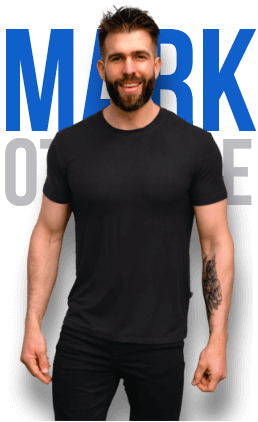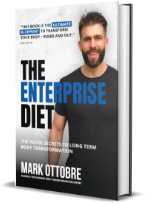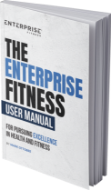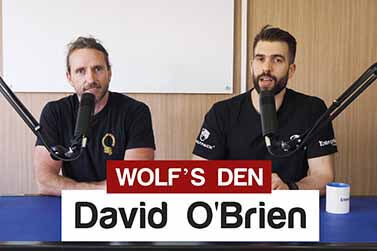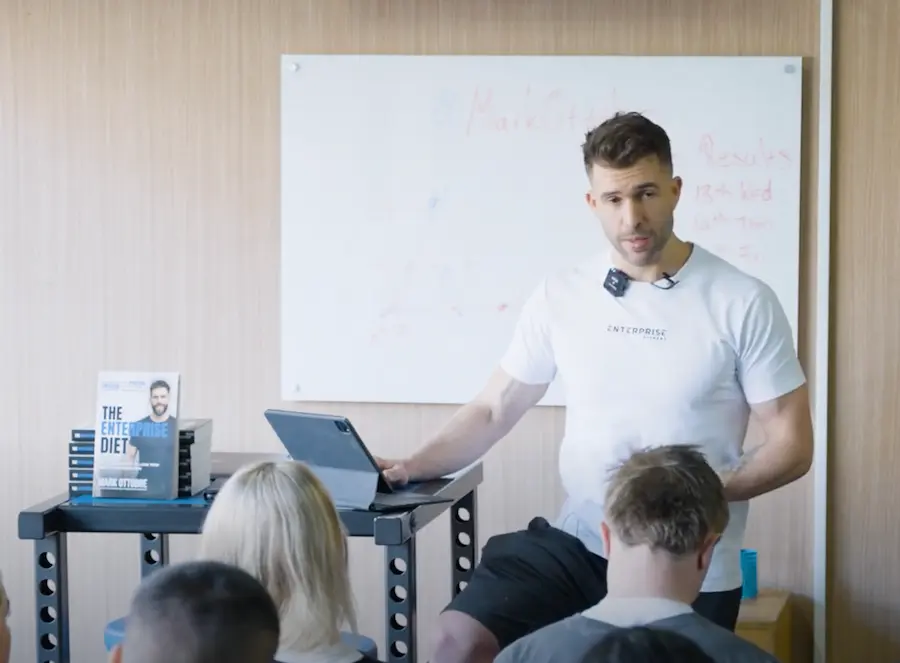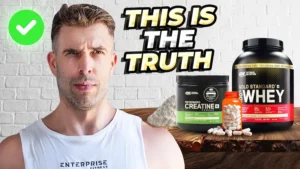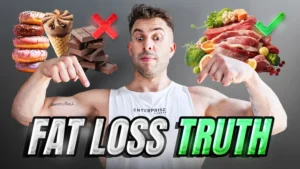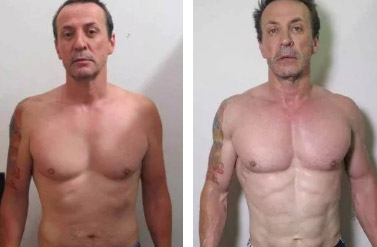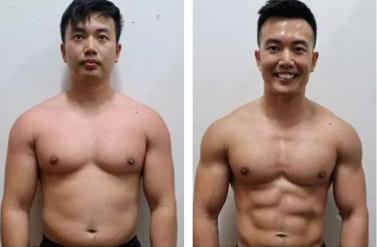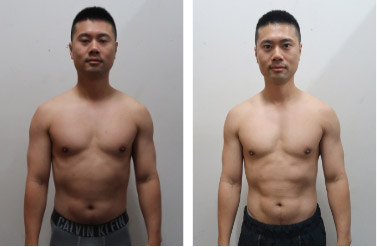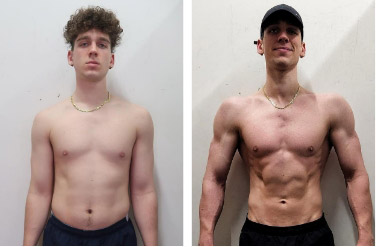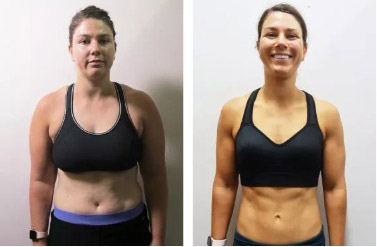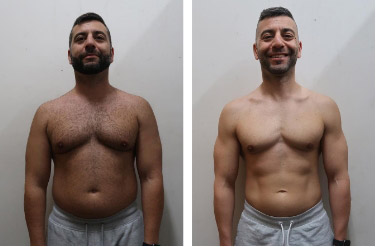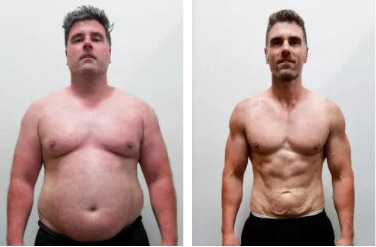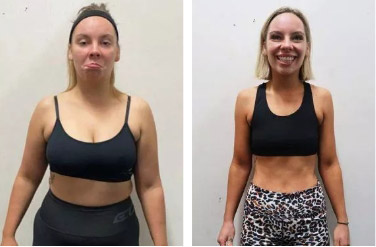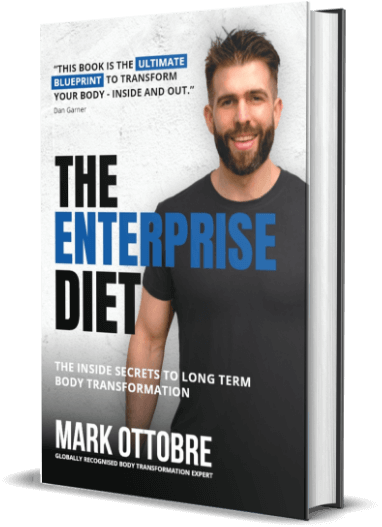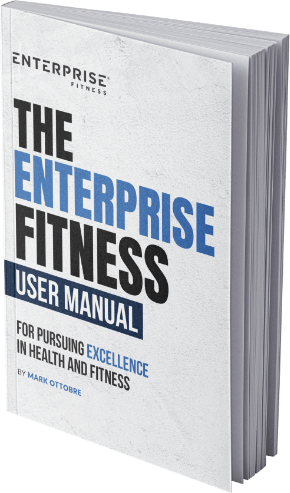Join us in this episode of Wolf’s Den, where we dive into the world of drugs, discussing everything from doping in professional sport, to the decriminalisation of cannabis and other recreational drugs.
This is a topic I have wanted to delve into for quite some time. However, given the intricate (and illegal) nature of drugs, I had to give it an academic flare
Enter Senior lecturer at Deakin University, Dr. Matthew Dunn.
Dr. Dunn has been researching performance and image enhancing drugs for the past 15 years. In this episode, he shares his knowledge on the drug world, and gives his open and honest opinions on the use and development of these substances.
I expect to get some flak for doing a whole episode on drugs… However the Wolf’s Den is not about ’safe conversations’. We want you to think, question and be challenged!
Enjoy the episode!
Useful Links:
Visit Dr Matthew Dunn’s research profile here
Read the research paper on substance use and online forums here
Download the Journal feature ‘There’s a (Drug Policy) Storm Coming’
Check out more info on Health Apps
Listen on iTunes or Soundcloud:
Related Posts
Transcript From The Perfect Diet For Optimal Body Composition | Wolf’s Den
(This transcription may contain errors)
Mark Ottobre: Hi. I’m Mark Ottobre, and in this episode of the Wolf’s Den, we sit down with Dr. Matt Dunn. Matt is a Senior Lecturer at Deakin University. We discuss a very important topic, drugs. Drugs both in sport, recreational drugs, and steroids. I just want us to take this quick time just as a disclaimer to let all of you know that this podcast is for information purposes only and, in fact, entertainment purposes only, and in no way, shape or form do we endorse or condone the use of drugs. Drugs are, and the drugs we discuss in this interview are illegal, and they should, at this point in time, be treated as such. So, please look after yourself and as Matt talks about if you are currently using any illegal substances, speak to your doctor. Speak to your healthcare practitioner. I hope you enjoy this episode.
Hey, folks. Welcome to the show that punches you in the face with information. Welcome to the Wolf’s Den. My name is Mark Ottobre. Today, we have an unbelievable topic, a topic that I’ve been wanting to do a show on for some time now. We have senior lecturer from Deakin University, Dr. Matt Dunn. We’re going to be getting into world of recreational drugs and steroids.
Welcome to the show, Matt. It’s absolutely a pleasure to have you on. We’ve got our co-host, Liam Fitzgerald here. So, the topic I wanted to kick things off on was the war on drugs. By all means, I’ve got a friend who’s a criminal barrister. We have spoken about the war on drugs a few times. His opinion from the legal side of things is that the war on drugs has been an absolute failure. Now, you’ve been studying both performance-enhancing drugs and recreational drug use for the last best part of 15 years, and you’ve been looking at the academic and the quantitative… what the actual research says, and not just what it says in Australia, but the research around the world.
So, if anyone is going to talk on the topic of steroids, recreational drugs, I think having someone like yourself who actually has research this, and not just researched it, but research every facet I would imagine for the last 15 years. It’s absolutely an honor to have you on. So, this is what I wanted to kick the show off, just to tackle the issue of criminalization and the war of drugs. So, what does your research lead you to?
Matthew Dunn: Thank you for having me on. I concur with your friend. The war on drugs has been an abject failure. It does nothing to help people who use substances, whether they’re illicit or licit or using something that was prescribed to them, but now they’re using because they’ve developed a dependence on it. It does nothing to help them get off drugs. It does nothing to help alleviate the harms that come from substances. All it does is push it underground. So, a lot of the problems that we see with substances related to the quality of them, so what’s in them, is related to the stigmatization of them.
Matthew Dunn: People don’t want to admit that they’re using something because it’s illegal, and they don’t want to go seek help if they’re having a harm from it because it’s illegal. So, the war on drugs has done nothing in my view.
Mark Ottobre: So, people sometimes quote places like Portugal, I think it is, that has legalized drugs. There was a rising violence, I think, or rising on criminal activity, and then there was a decrease. Has your research seen this or matched?
Matthew Dunn: Yes. So, I’ve got a colleague who did her PhD looking at the Portugal model. They decriminalized-
Mark Ottobre: Just for the podcast, can you explain the Portugal model?
Matthew Dunn: Sure. So, Portugal had a lot of problems with illicit substances, and everything was going into the criminal system. It creates a bottleneck. You’re putting people into jail that don’t need to be in jail. It’s giving people criminal convictions that don’t need it that then they carry through the rest of their lives, and that has effects on what they can do later on.
Matthew Dunn: So, Portugal decided to make it a health issue. They decriminalized the possession of illicit substances, and treated it as a health problem rather than a law enforcement problem. So, what you do see is a decrease with all those criminal sanctions because it’s no longer a law enforcement problem, and you see it bring treated as a health problem.
Matthew Dunn: So, for people that are injecting drugs, it means giving them access to sterile injecting equipment. It’s giving people access to the healthcare that they need. Funny enough, you see a rise in people having better health. When people are coming forward and talking about their substance use. It also means that we can move them into maybe treatment if they want treatment or putting them into a system where somewhere along the line if they are someone that’s dependent on a substance, they can then seek treatment or seek better health along the line.
Matthew Dunn: So, when everyone talks about the Portugal model, that’s what they’re talking about. So, it’s not legalizing it. It’s not saying, “Now you can walk down the shop and buy heroin or cannabis,” but it’s saying that if you’re detected with certain amounts, it won’t be a sanction or a criminal conviction or going into the law side of it. It’s saying that this is now a health problem.
Mark Ottobre: Right. So, just on that, what about the people who say things like, “Well, if we legalize it or decriminalize it, it’s going to increase users and potential harm for people”?
Matthew Dunn: Sure. So, we do say a number of people that don’t use illicit substances because they are illegal. To some people, if you remove that criminal or that law element, they may decide to use something or try something, but there’s no real evidence that that is a sustained change of pattern of substance use over time. We do see, I mean, cannabis has just been legalized in Canada. It’s been about a year now. We’re seeing a bit of an uptake because now, you can go into a government-owned shop and buy cannabis, but I think over time we’ll say that the numbers will either stay the same or they’ll probably decrease.
Mark Ottobre: So, when you say there’s no real evidence, is it just that there’s not enough countries that are forward thinking in terms of legalizing or decriminalizing drugs?
Matthew Dunn: Yeah. Look, it takes a lot for a country to decide that they want to move something from it being illegal to the decriminalized to illegal. We saw that with Canada. It’s one of the first Western countries to make that decision.
Mark Ottobre: It is all of Canada, not just particular couple of states.
Matthew Dunn: All of Canada. So, I was there in May, and you can walk in to a government-owned shop and someone will greet you in a very lovely store that looks very sterile, very nice posters of everything, and they’ll ask you, “What are you here for? What effect would you like? Do you want a cannabis oil or do you want a joint?” Yeah. It’s very schmick, and it’s government owned, and these are government employees. So, it’s very different, very foreign to what we would have here if you wanted to get cannabis.
Mark Ottobre: I mean, Amsterdam have this model, if I’m not correct… I mean, it’s quite able to get marijuana, say, in Amsterdam or is this a different model or better?
Matthew Dunn: Yeah. So, this is a different model. I think in Amsterdam, they have slightly changed it in recent years, and I think that’s because of the whole tourism that is around cannabis for people coming in to Amsterdam to use. Whereas in Canada, it’s for everyone.
Mark Ottobre: Right. So, what trends from your research? Is there any predictable trends from seeing this?
Matthew Dunn: No. Look, drug markets are really interesting because use is always dependent on the price of drugs, the purity of drugs, and the availability, and those things can go up and down independent of each other. There is some overlap. If something goes down in price, more people might decide to use something. If it’s better purity, someone might decide to use something. If it’s better purity, then that might mean more money, more cost for it. If something’s not available, they might switch over to something else. We see that with the synthetic drugs like the synthetic cannabis, drugs that mimic the effects of the established drugs. We see people if they can’t get MDMA, for example, they might switch over to something else. So, the surest thing in the world of illicit drugs is that people will always try and use them, and any type of policy that we enact to try and stop people probably won’t work.
Mark Ottobre: So, one of the things you said there was… Is it as simple as supply and demand in the sense that there’s more people who want to use it, and one of the points that my friend would make on this is that, generally speaking, I don’t know if this is true, obviously, I love to hear your thoughts, generally speaking, the price of most drugs has gone down over the decades, and that’s simply because more people have access even though it’s been illegal. Is this something that you’ve seen?
Matthew Dunn: It is to a point. Australia is really interesting because we are so much further away from the places where drugs are made. So, for someone who manufactures and then tries to traffic drugs into the country, there’s a lot of risk to that. We are an island nation. So, we pay a lot for ecstasy or MDMA. We pay a lot for cocaine as well because cocaine is manufactured in South America, and those types of countries to get it here takes a lot of effort. When there’s a very ready market in other countries in that hemisphere who will take it up happily. So, we do pay more for drugs than the rest of the world, but people are willing to pay it.
Mark Ottobre: So this model, I suppose on the war on drugs and as it fits into performance-enhancing drugs, specifically steroids, it seems to me… Well, I mean, there’s a couple of places I want to go here because in Canada… I haven’t looked at the numbers, but is it suggested that now that cannabis is legal, places the illegal drug trafficking places, is this necessarily the crime in basically dealing cannabis is going to go down by consequence of that because people can just walk in?
Matthew Dunn: Yeah. Look, it’s really interesting, and the reason why I think it took so long for Canada to do this is because they had to figure out the model because if the government is going to sell something, they need to sell it at a price where it’s probably going to make a profit, but it can’t be too much high than the illicit market because if I’m buying it from a guy down the street who’s growing stuff, why would I then walk in to a government store to buy if it’s more than what I’m buying already or if I’m growing my own?
Matthew Dunn: So, that was something that Canada had to tackle but yeah, they seem to have got it right. I think the prices are similar, but by making it government owned, it takes away the stigma, I think, and also it’s a revenue raiser, and we’ve seen that in the US where the states that have legalized it, they’re just making a huge profit. Now, there are people, as I said before, that will now try it because it’s legal. That doesn’t mean that everyone will keep using it. In fact, I think Canada ran out of legal cannabis the day that it was legalized.
Mark Ottobre: Wow!
Matthew Dunn: Yeah.
Mark Ottobre: That’s funny.
Matthew Dunn: Yeah.
Mark Ottobre: So, from your perspective of researching and looking at the data and the research, is this a positive step forward for the Western nations that Canada has done this, and I think why?
Matthew Dunn: I think so. I think so. I think we do see drug policy change in other countries and sometimes and particularly Australia we look at countries like the US, Canada, the UK, Europe and say, “Well, if they’re not doing something, why should we change?” The US really did lead the war on drugs. That’s where it started in the Nixon era, and countries signed on to the UN conventions because the US, basically, wanted them to. Canada taking that step is a really good step. We in Australia, I think, it’s a little way off. We’ve got medicinal cannabis, but it’s probably not as readily available as it should be for people that really need it. That’s a positive step, but I think it’s still a long way to go. I think Canada doing that was a good step.
Mark Ottobre: Is there a line on the war on drugs? I mean, it’s like, we allow cannabis to be purchased over-the-counter, but is this to say the lines that MDMA, cocaine, heroin, is there a line or from your opinion, from the way you see it, should everything be made not legal in a sense as you said before, but the Portugal model following this model where people can get certified sources, so there’s more of a controlled damage approach? How do you see if there’s a line on these things?
Matthew Dunn: Yeah. Look, I think the reason why we haven’t gone down the road of looking at decriminalizing or legalizing cannabis is because I think people are scared that once you do it for one drug, you have to do it for all of them. I personally think I’ve made up my mind whether decriminalizing or legalization is the better model. I definitely think decriminalization for all illicit substances is the best first step.
Matthew Dunn: Once you legalize something, it’s very hard to make it illegal again. I mean, tobacco and alcohol are great examples. If the government said, “Right. Tomorrow, alcohol is illegal,” I think there would be riots in the street. So, once you make something legal, you’ve really got to make that decision because it’s probably not then going to be illegal for a very long time, if ever. So, I think decriminalization is a good first step.
Mark Ottobre: Let’s just circle back to that because I’d love to know the differences between decriminalization and legalization from a perspective of ramifications when you’re considering this. You said you’re undecided which one is better. What are the pros and cons of each?
Matthew Dunn: I come from a public health point of view. So, we see this with alcohol whereby just because something is available doesn’t mean it’s good for you and doesn’t mean the people that use it have got good mechanisms or ways of using it in a way that doesn’t cause harm to themselves or others. So, we see that with alcohol. It’s everywhere. It’s a Saturday night. There are going to be people that will go to the bottle shop or have alcohol at home that will drink to a point where it’s harming themselves or others.
Matthew Dunn: So, I don’t know, and we do it in driving as well. People consume something that they legally purchased, and then do something stupid with a car. So, once it’s legal, it’s very hard to put the genie back in the bottle. So, I think we just remove the criminal sanctions that go it, the criminal elements.
Matthew Dunn: So, if I’m caught with two MDMA pills or whatever, a bag of cocaine, providing it’s not 400 kilograms or something, but if it’s a personal use amount, why send someone into the criminal justice system and all the money that goes with that, all the time that goes with that? Someone gets a criminal conviction that has real consequences for the rest of their life. I think we just remove that element, and make it so it’s from a criminal aspect.
Mark Ottobre: This is where the Portugal model falls in.
Matthew Dunn: Yeah.
Mark Ottobre: So, where does, I suppose, steroids fit on this continuum? Because to me, it seems like the recreational drug use is one, but then you have the image-enhancing/performance-enhancing drugs, which people aren’t necessarily obviously doing steroids to get high. They’re doing it for more of an outcome, usually image, performance. So, in this one, I mean, should we treat it the same? Decriminalize?
Matthew Dunn: Yeah. Look, I’ve published a paper recently, an editorial, where my personal opinion with these substances is we make it so it falls under a medical model. This goes into the whole doping drugs in sport aspect. We make these substances illegal. You can’t use them if you’re a professional athlete. They are scheduled substances in Australia or if you use them without a prescription, there comes a criminal sanction with that. It does nothing to help the health of a person. There’s been some really good commentaries over the years that said, “Look, at the Olympics, if we focus more on protecting the health of the athlete, if they were using these substances, this might involve having health checks before someone decides to use something, monitoring it over the life of when they decide to use it. The quality of the substance, we know it’s pharmaceutical grade, and if they have any problems, we can be on top of that.”
Matthew Dunn: Going back to what I said before, if something is illegal, it’s stigmatized, people don’t talk about it. If someone has a problem with it, a health problem, they tend not to talk about it. Whereas, if it’s not, they might be a little bit more forthcoming to said, “Yeah, I’ve had a problem,” and going to a GP or whoever. With these substances, I think if we made it so they’re prescribed, so if I decided one day that I want to really put on some serious muscle, I go to the doctor or a doctor who’s trained in it to say, “I’m thinking about doing this. Let’s talk about it,” I think that would just remove a lot of the health problems that we see from these substances and a lot of these health problems are longterm ones that we actually don’t know, we’ve got no data about. We don’t know what the longterm health consequences of using these high doses of these substances… But if they were prescribed, we might have a better idea.
Mark Ottobre: That’s quite fascinating because on one end, and this is actually a topic that I did want to jump into with steroid use specifically… On one end we have the gym rat/body builder who’s a heavy user and says things like, there’s really no issues with steroid usage, so long as you use it in a balance. Then you have I suppose the medical establishment, not even the medical establishment, I suppose the general stigma of steroids is that it’s going to cause heart failure and you’re going to get cancer. All these things are thrown out and probably sensationalized. From your research, I know that you said that there’s not… You said it as simple as, “There isn’t enough data to point conclusively that we don’t know what the effects are. I mean, at this point, can we say, “Yeah, there are actually some effects on steroid use”?
Matthew Dunn: Yeah, look, one of the first things that I get asked when I tell people I research steroids, are they bad for you? It’s kind of a yes and no type response. No if you injected yourself with a steroid right now. You wouldn’t overdose on the floor like you would maybe with heroin. It’s not that acute harm. A lot of the harms when we interview people that use these substances say that they consider nuisance harms. You get more acne or you get night sweats. If you stop taking the substance or if you take something else, it might reverse or counteract that negative effect. The longer term harms, we don’t have good data about and there’s a number of reasons as to why we don’t.
Mark Ottobre: Can we just define what the longterm harms are?
Matthew Dunn: Sure. In the US, they’re starting now to look at the people that might’ve started taking steroids in their 20s, back in the days when Arnie was taking them. If they’ve been taking them for 30 years, what does that person look like? What do their insides look like? Some data coming out looking at suggesting there might be some longterm cardiovascular effects. I know the liver is one that people are concerned about if you’re going to take steroids but we don’t really know like we might do with other substances. If you drink a bottle of bourbon a day for 10 years, we might have a bit of knowledge of what that looks like. If you’re injecting methamphetamine every day for 10 years, we might have an understanding of what that looks like but with steroids and the other substances that people use, we just don’t have that knowledge, because that’s the other question I got, “What happens if I use these in 5, 10, 15, 20 years time?” And we just don’t really have the good evidence around that. That’s not to say that there are huge harms. There may not be but as a researcher, I’d like to know that from the data.
Mark Ottobre: Anything that suggests… There’s one that does get thrown out a lot is heart enlargement. Is that factual or is there just simply not enough data to confirm?
Matthew Dunn: The US researchers would probably say that that is a real outcome. I probably would like to see more data but that’s the stuff that’s emerging now. As I said, we’re seeing those guys getting to middle age or later middle age that started taking them back in the ’70s, we’re starting to get some of that data. The stuff that does concern me, and this is something that’s raised by the consumers themselves when they talk to me in my research, is that when you’re taking steroids, your body stops producing them and it’s not like a tap where you can turn it on and off. The body decides when they kick back in, not you. I’ve interviewed guys that have said, “If I had have known that my body would shut down the way it had, I wouldn’t have started them,” or, “I wanted to start a family. I started using steroids in my 20s. Now that I’m married and want to have kids, we’re finding that hard.” That’s not to say that the steroids caused infertility or anything like that but definitely guys are sitting there thinking, “If I hadn’t have done that 10 years ago, would I have a kid now?” When I talk to people, that is the main one, saying, “If I come off it, what happens then? How long will I have to wait for my body to kick back in?”
Mark Ottobre: That is a very interesting point because obviously then you’re looking at post-cycle therapy and all these kind of things. One of the more forward-thinking idea that I once heard was… testosterone receptors in the brain and one of the treatments for males, particularly in terms of depression could potentially be steroids. They started feeling more and more well about themselves and being prescribed by a doctor to increase testosterone, therefore increase overall wellbeing. What I’ve observed as a certified gym rat, when there’s guys at the gym or whatever and they’ve, say, done steroids and then they get off, one of the things I would look at is mental health because their physique has gone from, let’s say 100 kilos jacked at four percent body fat to now 80 kilos, barely able to lift something.
Mark Ottobre: From your research, has there been a mental health component that stood out to you and goes, the actual bigger issue…? Is the bigger issue mental health with steroids?
Matthew Dunn: We’re starting to now look at that. Just like we looked at eating disorders amongst women and the mental health aspect with that. We’re seeing this with men and steroid use. Again, when I get asked by people saying, “You research steroids, I’m thinking about doing them,” one of the big things that I say is, “First of all, why? And is it related to just, I was the kid that was beaten up at school because I was scrawny and now I want to get bigger? Probably don’t be that guy because how big is big?” I don’t personally believe that there is an addictive factor to steroids but I think it’s more a psychological dependence. I think you do see guys put on those kilos, then they go off, they lose some of it and then they don’t like the way they look, so they go back on. I’ve certainly interviewed guys over the years that have said, “I started it and then I couldn’t get off because every time I did and I was starting to lose that size, I would go straight back on.”
Matthew Dunn: Going to what you said before, some of these people are now, the steroids that they’re taking are to basically replenish what the body’s not giving them. They’ve taken so many over so many years that the body has stopped producing it so they’re taking it almost as testosterone replacement.
Mark Ottobre: Should we be scared of that as a health concern? Is that a bona fide, “If I take steroids, my testosterone’s going to shut down and therefore I’m going to be injecting artificial or taking orally artificial steroids”? I suppose my question is, or is there simply not at this point enough research to say that’s actually any worse? I suppose really what I’m asking is, the body producing its own testosterone versus me injecting it just to be at what my body would be producing normal, there almost seems to me that that there’s no evidence that my body producing it on its own is necessarily… Like, it’s not better or worse. It’s just, if I’m at this point and if I’m going above, is that where the health consequences come from?
Matthew Dunn: Yeah, I think that’s an individual thing that each person needs to consider but certainly when I’ve done my research, you speak to some of the old school guys who say, “I’ve been body building for 20 years, back in my day if you were going to do them, you had a good program for your weights, your nutrition. It was only when you really plateaued that you probably started looking at steroids. If you were going to compete, definitely you’d have to do it but you got everything else in place first.” Then they talk about the young guys who come in and they go, “Right, I want to get jacked,” so the first thing they do is use steroids. We’re seeing different patterns, I think, over the generations. That’s a big generalization that I’m saying but certainly the concern is that you’ve got younger guys that go, “I need to look good,” or, “I’m a [inaudible 00:24:53] so I need to be in my best physical state, but I also may play footy on the weekend, so I’m going to take steroids,” versus the old school guys who might’ve done everything else first and then chosen it.
Matthew Dunn: I think, as I said, when I talk to people, it’s thinking ahead and saying, in five years’ time, if you’re still taking this because either you’ve become dependent on the way that you look in the mirror or you’ve just got to take these because your body’s not producing anything, are you willing to accept that? Some people might, some people not. I think it’s a real individual thing there. Obviously tracking this stuff over time would give us a better evidence base from which we can talk about.
Mark Ottobre: I suppose one of the questions, I’m going to there in a roundabout way, is say I’m 40, I’m 50. My testosterone is bottoming out, if I’m wanting to be in the best shape that I possibly can, should that be a cause to say, “Doc, I’m not at where I was when I was 30, there’s no risk factor for me taking steroids in my 40s and 50s, I just want to get back to where I was in my 30s.” Would that not be anti-aging treatment? Again, I suppose people watching this, the thing would be, what about the risks? But as we’ve established, there’s simply not the research there to establish the risks, from what you’ve said. Is that a legitimized way to actually look at the world of when to take it?
Matthew Dunn: I think so because there, you’re making the distinction between something that’s prescribed for a reason versus non-prescribed. We’re certainly seeing a bit of that crossover where someone might be prescribed steroids for testosterone replacement or something else, and this is a thing I always say to people, you need to remember that these substances have very legitimate therapeutic uses. They just happen to have benefits outside of those uses. One is prescribed by a doctor. We’re doing all the tests. We’re monitoring over time and it probably is testosterone replacement and I think we need better data about that over time. Going back to the whole war on drugs. What it does is it stops people doing good research, looking at the legitimate effects that come from using these substances. Then next to the person that just decides, “I’m going to do it.”
Matthew Dunn: I think sometimes people kid themselves that, “It’s testosterone replacement therapy,” where I think they’re just giving themselves an excuse to use it. Certainly in my opinion, we live in a society where we want a pill for everything and sometimes that’s good, sometimes that’s bad but I don’t see why we can’t start looking at placing this under a medical model and seeing what benefits might come from these things.
Mark Ottobre: Women and steroids is a different topic. What is legitimate, apart from a woman who wants to be a certain amount of muscle mass, a certain degree strong, I suppose masculinize their physique… Is there another use outside that for females to use steroids?
Matthew Dunn: You’d have to ask them. We’ve tried over the years but we talk about steroid use as being a hidden population and drug users in general being a hidden population. Females who use steroids and other performance and image-enhancing drugs really are the hidden, hidden, hidden population. I think in my time, in all the research I’ve done, we’ve only ever had two women be a part of it. I’m not sure why that is, whether it’s just because they don’t want to talk about it or we’ve not looked in the right places or we haven’t done the research that makes people want to come forward. But certainly we did a study a couple of years ago and we had two women talk about it. Both of them were just about to start their first cycle because they were going to compete and they stopped using after their first. They didn’t like the way that their body had changed. I don’t believe that at that point, with how long they’d been using that they’ve really seen enough changes anyway but it was enough for them to go, “This is not for me.” That was really interesting. Their perception was it was masculinizing their bodies and they didn’t like that.
Mark Ottobre: With steroid usage, there’s differences between anabolics and androgenics. Can you speak to that?
Matthew Dunn: God, no.
Mark Ottobre: No?
Matthew Dunn: Look, I’m not a medical doctor and so whenever I try and put these things together, I always get them completely wrong and people look at me crazily but you know, there’s the anabolic ones, because one’s building up and one’s breaking down, kind of. In the way that I say it to people that don’t know anything about it.
Mark Ottobre: That’s how you basically look at it.
Matthew Dunn: That’s how I look at it. We call them anabolic-androgenic steroids or just steroids in general. With the knowledge that you can’t pick one that’s fully anabolic and one that’s fully androgenic, it’s going to have certain effects on people. There are ones that will do more than the other but we just call them steroids. We don’t really look at the difference between the anabolic and the androgenic.
Mark Ottobre: In the research that you’ve done and looked at the populations, is it generally accepted that people will be taking more than one substance at a time?
Matthew Dunn: Yeah. We call that poly-substance use. That happens in pretty much any drug-using population or drug-consuming population. The person that takes MDMA on the weekend is probably taking something like an amphetamine or a methamphetamine and a cocaine or something else over their lifetime or even in the last six months. People that use something will use other things for a variety of reasons and that’s the same on the gym floor. The person that’s taking steroids is probably taking a range of other things for a variety of reasons. That can be legal substances, so things like creatine or protein powders, to the steroids or the growth hormones, the SARMs, those types of things. Every person who’s taking them will have a reason of why they’re taking something, what effect they’re trying to get. We’ve done research looking at the online forums and how people talk about this. I think if I had a dollar for every unique plan that someone had, I’d be a rich man.
Mark Ottobre: What do you mean, unique plan?
Matthew Dunn: Well everyone will have their reason of, “If I’m the person that has never used, what should I use to start myself off? If I’m trying to cut down what I should take, if I’m trying to bulk up, what I should take,” and it’s interesting just looking at people’s… the protocols that they have for these types of things.
Mark Ottobre: Do you look at those protocols and shake your head like, “What the hell is this person doing?”
Matthew Dunn: As a public health person, I’m more interested in whether they really know why they’re doing what they’re doing. I don’t have a huge amount of opinion around whether people should do something or not. As a harm reductionist, my hope is that if people are going to do something, that they inform themselves. If you’re going to go out and do MDMA tonight, know what it’s doing and what some of the side effects might be. If you’re going to take GHB, the same thing. That should be the same with steroids. You do see on the forums where people login, probably guys, saying, “I want to put a couple of kilos on, what should I take?”
Matthew Dunn: That person scares me because they’ve done nothing to do with research or anything like that. If you’re going to do something, know what it is that you’re trying to achieve, what might get you there but what might be some of the harms or the obstacles.
Mark Ottobre: Would you say that that person, though, the person that’s going on, logging into the forum saying, “Hey, what should I take?” Would that not be indicative of the general population though, when it comes to drugs?
Matthew Dunn: Yeah definitely but what’s really interesting with the forums, and you see this in the locker rooms as well, where people go up to the guy that they know using steroids and say, “Hey, I want to look like you. How do I do it?” There’s this mentality of, you’ve got to show me that you’ve done some research and you’ve got some knowledge before I give you my knowledge. Certainly I think the forums are a great way for people to, from a harm reduction point of view, get the advice that is going to, hopefully, reduce harm. But if you’re coming in without having done any research into it, just saying, “Hey guys, I want to put 10 kilos on, what do I do?” That really worries me from a harm reduction point of view but if he said, I’m thinking of doing X, Y, Z at these doses for this long and I’ve done my bloods with my doctor and everything looks good, what do you reckon?” That might be a better approach from a harm reduction point of view.
Mark Ottobre: But the gold standard from a harm reduction point of view would be to get it from your doctor?
Matthew Dunn: There would be people that would say… I think so. I think a gold standard in a perfect world would be, I go to a doctor who has done endocrinology or something like that and say, “I want to put on five kilos of muscle because I want to go compete, let’s do this,” and the doctor goes, “Right, let’s do some bloods. Let’s look at your family history. Let’s do all those things. Half way through your cycle, let’s do your bloods again. Let’s have a look at everything.” In a perfect world, that’s how I would love to see it. I think we do need some medical model placed around it. I think again, people, if you just say, “Here, take everything that you want,” we’re probably not the best people to say no to something. I would like to see it under a medical model with trained specialists but that’s a perfect world.
Mark Ottobre: While we’re on that topic, I wanted to read something from one of your published pieces. It was in post-cycle therapy for performance in image-enhancing drug use, a qualitative investigation. What stood out to me on this one was you, I think, interviewed a bunch of participants. Participant 10 said, “My own GP, I let him know that I was taking off-the-street steroids, purchased through the black market but also asked him if he would monitor me. I wanted to buy some anti-estrogens off him as well, so I didn’t have any side effects, so it limits the amount of stuff I do off the black market, so I can get genuine products.” I contrasted this with one participant one said in the study. He or she, I’m not sure, said, “The GPs should be informed. They need to do more research on it. A lot of the GPs have no idea about it. They’ve got no fucking idea what it does. There is a lot of health benefits with it and they don’t even know about it. All GPs I see want to do nothing with it. They won’t take on board any health benefits you bring up. They’re just straight up no, no, no.”
Mark Ottobre: I suppose the reason why I point to those as a public health thing, it seems to me that the issue with steroids is the stigma if someone walks in and says to the doctor, “I want to get bigger. I want to do some steroids. I want to get stronger,” doctor immediately is probably going to have their back against the wall. I suppose for people in participant one’s experience, the doctor seem to be a bit more supportive. Is this indicative? Are there doctors that you can actually talk to? I suppose, from your perspective, what public health, not necessarily advice but points of view that people who are wanting to use… How in this model that we have in society today, where it’s not legal, it is criminalized, what are some things that people can do to start being more sensible in the way they do it?
Matthew Dunn: A lot of the work that I’m studying to do now is trying to work with GPs to make sure that they do understand what these substances are. GPs and chemists will be the first to put up their hands and say, “I don’t know what these things are and why people would use them outside of the reasons that I’ve been trained that a person would take these substances.” Yes, there are people in their health professions that say, “No, don’t take these. Just don’t do it,” and I’ve certainly spoken to consumers who have said, “I told my GP and they said, ‘I never want to see you again,'” but there’s a lot more out there that do want to know. What am I looking for? What are the things that I should be trying to treat them for? What should I because monitoring? I’ve also worked with GPs where they’re looking at it going, “How do we even put this on Medicare?” Like, “If someone comes in, they do tests, how do I then claim this back?” There is a whole bureaucracy behind all of that.
Matthew Dunn: But again, going back to the forums, that’s why I think they’re really important for people, to be going and having a look at what people who readily admit are using these substances, what are they doing? And getting that advice from other people. I advocate to health professionals that want to know more about this to look at those forums as well because they will get a lot of knowledge from the mainly guys that are doing this. I think one of the problems, we have this divide between the community, is because back in I think it was the ’70s or the ’80s, the American Medical Association said, “You get no benefits from taking these substances.” When you’ve got guys that have got arms bigger than my head. It was a stupid thing to say.
Matthew Dunn: That really caused a bit of a schism between the bodybuilding community and the medical community. I think that’s starting to come back where people are like, “If they’re going to take something, I want to make sure that they’re the healthiest that they can be.” I say to the doctors that say, “I don’t know anything about this,” go onto the forums. Or if someone comes in and says, “I’ve been taking a cycle of something,” ask them, “Why?” Because they’re going to be the best person to tell you. I think people that are using these being upfront with their health professionals and if they get knocked back from them then they’re not the health professional for you. But it’s about saying to people, “This is why I’m doing it. This is what I’ve read up on. This is what I’m lead to believe is the effect that I’ll get from it,” and for the health professional to go, “Okay, I’ll integrate that into my knowledge of these substances and try and come to optimal care for the patient,” which is what I’m concerned about.
Mark Ottobre: Excellent. You wrote another paper. It was, in brackets, drug policy, close brackets, storm coming. There’s a storm coming. I’m curious. What’s the storm?
Matthew Dunn: That was the editorial I talked about before about just changes to drug policy worldwide. What has been the status quo is no longer. I think what really drove me to write that piece was having gone to Canada last year and this year but also I’ve been going to Vancouver since 2002 and seeing the opioid crisis just sweep across Canada and the United States. They’re prescribed substances. Largely the people that are having the most harm are people that have gone to their GP or have been prescribed these substances for pain or some kind of chronic condition that are now dependent on these substances.
Mark Ottobre: What substances are we talking about exactly?
Matthew Dunn: Things like oxycodone, OxyContin, those types of things. So these are prescribed by medical professionals. That really got me thinking, cannabis had also been legalized in Canada but we’ve seen other countries, Ecuador, taking a different stance to… They’ve legalized substances or decriminalized. We are seeing things change around the world. We’ve got medicinal cannabis in parts of the world, even here in Australia. There’s been a big push looking at psychedelic assisted therapy. So using LSD and psilocybin. When they were legal in the ’60s, people were doing trials on these looking at the effects on things like alcoholism and mental health but because they became illegal, that just shut that down but we know that there are beneficial effects to people with anxiety and post traumatic stress. End of life issues to do with, there’s been some studies looking at people that are terminally ill, using psychedelics to help them deal with that.
Matthew Dunn: What I said right at the top of this interview is, when you legalize something… When it’s illegal, it just stops the research. Imagine where we’d be if that hadn’t have happened with… We might have cannabis for medical purposes rather than people going on to prescription opioids. That’s really where that all came from. It was looking at, these are substances that people are going to continue to use, how can we do it better?
Mark Ottobre: Definitely. A topic on that is, I forget which country it was but the pills at festivals, there’s certain countries that have embraced putting pills, where you get the pills from at festivals. It’s minimized the overdoses and things like this. Do you know much about the-
Matthew Dunn: Yeah, full disclosure, I do volunteer work for The Loop Australia, which is one of the two organizations here in Australia that’s trying to get pill testing up, or drug checking. But The Loop UK, they do it in the UK, so they go to the big music festivals like Boomtown and do pill testing on site. It’s been around in Europe for quite some time. There are even countries in Europe where, if you buy an ecstasy pill, you can mail it off in the mail and a week later, they’ll send you a full forensic analysis of what’s in that pill. You obviously don’t get the pill back but it’ll say what’s in it and the purity of it. We know that when people get that information, they make better choices around their substance use than people that don’t.
Matthew Dunn: The big problem in the UK at the moment is they’ve got really, really strong MDMA. Stuff that can probably cause an overdose. When they tell people this at music festivals, they can then give the harm reduction advice. That always starts with, if you don’t want a negative effect, don’t take the drug but if you’re going to take the drug, with this particular pill, I would probably halve it or quarter it, wait a while, don’t mix it with another drug. Don’t mix it with alcohol. It’s giving that practical harm reduction advice to someone that is at an event who’s already bought the drugs, that’s holding them intending to consume them. It’s a no-brainer really.
Mark Ottobre: Prohibition basically, just doesn’t work.
Matthew Dunn: No, that’s my opinion.
Mark Ottobre: Why? Can you expand on that?
Matthew Dunn: People have always sought to take things that will alter their mind or their body. I mean, I get up in the morning, the first thing I do is have a coffee. That’s a drug. It changes the way your brain works. It stimulates the body. There are people that will wake up and have a cigarette. There are people that get sick that will take Panadol and take more and then more. That’s an over-the-counter substance. People will always look for substances to do something to have an effect and we just happen to live in an age where some can cause real harm and people are still going to take them. Let’s just try and divert some of our dollars to making them healthy, if they choose to stop using them, or if they take something once that they don’t die from it.
Mark Ottobre: Just a point on social stigma, Michael Pollan, great author, I’ve heard him in an interview once say that, in the West, we celebrate caffeine because it makes us more productive but we demonize cannabis because it makes us slower. I’m not going to put words in his mouth but one of the points that I took away from it, is this simply social stigma? That we’ve been trained to… I suppose he’s raising the point, is cannabis as bad as what society would essentially put forth and is it comparable to something like caffeine? It’s just the fact that one is making us more productive and the other one is making us want to relax and relaxing in the West, our perception of relaxing is obviously the opposite of being productive and going to work and making money and all these things. In the West, we’re more about celebrating achievement and any drug that helps us celebrate achievement is celebrated in a sense, say like caffeine. I mean, in the West, there’s no doubt about it, we have a caffeine culture, you know, fueled by caffeine, get the t-shirt now. Whereas marijuana, weed, cannabis, whatever you want to call it, I mean, does it get a bad rep for that reason?
Matthew Dunn: I think all drugs do. I think your examples there are really interesting where, yes we celebrate productivity and achievement. So one of my research areas is study drugs. Anything that a person takes to help them study for longer, get through an exam period, stay up all night, whether that’s caffeine, modafinil, Ritalin, whatever the case may be. Some people will say, “That’s just helping me achieve more. It doesn’t create knowledge in my brain but it just allows me to stay up for 12 hours, read a really thick textbook and then hopefully retain that information.” Other people would look at that and say, “That’s probably not a good use of your time. If you’re tired, go to bed,” because we know that sleep is really important. Same with steroids. The person who takes them may say, “I am being my optimal best. I’m trying to achieve the best of me,” whereas other people would look at that person and say that they’re being egotistical. The person that takes LSD because it opens up creativity, other people wouldn’t get that.
Matthew Dunn: It really is a subjective thing. I think with cannabis, there are so many other uses that we just don’t know about because it’s been illegal. Medicinal cannabis is the best example. There are people that use it because it alleviates symptoms of whatever health condition they’ve got. Imagine if we had that rather than OxyContin.
Mark Ottobre: I know he’s raring to ask some questions. No?
Liam Fitzgerald: Yeah, I’ve got some questions.
Matthew Dunn: Fire away.
Liam Fitzgerald: Do you think here in Australia, with things like TRT and obviously older adults who generally do use testosterone, it’s very hard for them to get help or to get the support they need?
Matthew Dunn: Yeah. I haven’t researched a lot about that but I know there’s stuff happening in the US. I do think it’s a misunderstood or poorly understand phenomenon and I think that again comes back to medical practitioners see the uses for these substances and anything outside of that is a bit of a gray area for them but I certainly think that we should be doing more in that space. I don’t mean for everyone to run out and get a testosterone injector but I do think if we want to live longer and with better health, then that’s maybe something that we need to look at.
Mark Ottobre: What is, I saw in some of your papers, DNP? I just saw a bit about it that it’s quite harmful in what it is. What is that substance?
Matthew Dunn: Absolutely no idea what you’re talking about.
Mark Ottobre: Dinitrophenol. Am I saying that correct? DNP?
Liam Fitzgerald: It’s a hallucinogenic.
Matthew Dunn: I think it’s a hallucinogenic. I’m not a pharmacologist, so my knowledge of all this stuff can be hazy but certainly, if it’s one of the newer substances, these have come out to circumvent laws that make other substances illegal. So in Australia, something becomes illegal because it’s related to another substance that’s already illegal and so what the chemists try to do is add something onto it that isn’t illegal and so we’re seeing all these new substances coming out that some of the psychedelics and some of the stimulants can be not good for you.
Mark Ottobre: This is the problem with drugs in sport though, right? In the sense that the chemists are constantly inventing new drugs.
Matthew Dunn: They’re ahead of the testers, yeah. We see this in the drug market. When the purity of MDMA in Australia went down, people started making other things that mimicked MDMA but wasn’t quite the same but it was legal because of the chemical structure of it. The government makes that illegal, so the chemists just try and make something else. It’s just this never ending cycle.
Mark Ottobre: Which probably ends to a more dangerous point, I’d imagine.
Matthew Dunn: Yeah, and so you see things like in North America, with all the prescription opioids where they just keep making stronger ones and stronger ones and stronger ones because sometimes they’re not illegal because they’re new. People are just trying to find a way around the laws.
Mark Ottobre: I think it’s time we’ll have a quick break and be back with more great content from Matt.
Mark Ottobre: I hope you’re enjoying this episode of the Wolf’s Den, brought to you by our good friends are Personaltrainermentoring.com. If you’re a personal trainer looking to level up your business and career, head over to personaltrainermentoring.com. They have a free, $500 gift pack ready and waiting for you. A digital gift pack that contains a free course, all about how to screen and assess your clients. The course is over two hours long, gives you the ins and outs of screening and assessment. Also included in the pack are three e-books, all on how to make more sales, get more clients, and basically get better results. So if you’re a trainer, head over now. Personaltrainermentoring.com. Leave your details and get on the fast track to success.
Mark Ottobre: Are you looking to get into the best shape of your life? Are you looking to lose that last 5, 10 or even 20 kilos? I founded Enterprise Fitness, well I should say I started personal training in 2006 and Enterprise Fitness has been an evolution of my career and finally has brought me to this point of opening up this facility here. This facility is dedicated to bringing you the very best standard of personal training, bar none. We have trained over 250 champions in competing in a variety of different sports as well as quite literally thousands of before and after transformations, helps people get in the very best shape of their life and heck, we’ve even educated a stack of trainers throughout the world. This has become a travel-to destination.
Mark Ottobre: Folks, if you are in the Melbourne area, hit us up. It’s Melbournepersonaltrainers.com. This is the place to train. You can email us at [email protected] or the website is Melbournepersonaltrainers.com and make sure you check us out on Instagram as well. Reach out to us. We’re here to help and again, this is the place you want to be if you’re serious about your fitness and physique goals.
Mark Ottobre: We’re back in the Wolf’s Den. Our guest today is Dr. Matt Dunn, talking about an issue that often doesn’t get talked about. We are addressing the elephant in the room today. We’re talking about performance-enhancing drugs and recreational drugs and Matt has had over 15 years researching both of those topics. Let’s get back in. Hope you’re enjoying this interview that we’re doing with Dr. Matt Dunn. Matt, let’s talk about drugs in sport. Is everyone using?
Matthew Dunn: Everyone tells me that they are. About 10 years ago, I did a project, world first project looking at recreational drug use amongst elite Australian athletes and when I told people I was doing that project, first thing people would say was, “They’re all on it.” I don’t know what it was but they’re all on it. Certainly, as testing catches up to the substances, we are seeing more and more being caught. We’re getting athletes from the London Olympics, the clean games, being stripped of their medals and those medals are being re-awarded. I don’t think as many people are on things as we think. This is where you’ve kind of got to make the distinction between the performance drugs and the recreational drugs. Performance-enhancing drugs, look, probably, I’m not naïve, if you want to be a professional athlete in this day and age, you can earn a lot of money from being an AFL player or a Rugby League player or winning and Olympic medal. I’m not naïve to think that people aren’t doing something.
Matthew Dunn: In terms of recreational drugs, I don’t think it’s as much as people think. Certainly our data, which is now about 10 years out of date, but when you compared rates of MDMA, cocaine, amphetamine, those types of drugs, to the general population, it was much lower. That kind of makes sense. I mean, if anyone’s taken even too much caffeine, you know what the effects can be from that, you get that high and then you get the crash. Illicit drugs are probably very much the same. I don’t think they’re all on it and some sports have increased their testing for those substances but I think it’s more than probably what we think but I guess the question that I often ask is, why do we care? And I haven’t gotten a good answer to that.
Mark Ottobre: Do you think we should take the brakes off in the sense that, instead of this thing where we’re constantly testing athletes and putting them in the media and shaming them for the life’s work and they took a performance-enhancing substance of some sort… I mean, Lance Armstrong, that was a good example, where they were on it for years without anyone really being the wiser. Is it a time in our society where we say, “No, we should just let athletes be athletes and if they can get an advantage somehow with performance-enhancing drugs and it’s a fair playing ground for everyone,” is that an approach?
Matthew Dunn: It’s certainly an approach. Look, the editorial I wrote about placing steroids under a medical model really came from work from an ethicist in Oxford University, who’s talked about this in doping drugs in sports, saying, if we stopped penalizing, we would move it under a medical model, and the same thing applies where, if you’re an athlete who wants to use something to get faster, you get the test done, you get the pharmaceutical grade stuff and if there was any problems, you’d be able to deal with it. I don’t know. The argument for having clean sport, and I hate that phrase but having drug-free sport is that it’s a level playing field and my response to that is, the athlete that is competing in swimming that comes from a country that doesn’t have a pool, how is that a level playing field? How is it a level playing field where you’ve got athletes in the US training at custom-built, Nike-funded centers versus athletes in other countries that don’t have that.
Matthew Dunn: We see stories every time there’s an Olympic games of athletes turning up and not having the equipment for the sport that they’re competing in. It’s not a level playing field already so I don’t know how the element of substances makes it any more level than what it is but certainly if you’re looking at health, then you might take that view. I’m not saying everyone go off and use something if you want to be an athlete. I’ve got a 13-year-old nephew who wants to be an AFL player. I’m not going to say to him, “When you hit 18, go use something.” I think we’ve got to look at what we want as a society and whether that fits in with our values.
Liam Fitzgerald: Recently, there was an Australian swimmer, she was taking SARMs, selected antigen receptor whatever. SARMs. It’s basically, as it’s described by people, steroids but without the side effects. This swimmer had to withdraw from the Olympic team or the Commonwealth team or whatever. The substance that she had was to aid with muscle growth. What are your thoughts about SARMs and what do you think about the swimmer that took these?
Matthew Dunn: From the research that I do, it doesn’t come up a lot. Certainly I know that people are using them and every time I get questions from people saying, “People are using SARMs,” it’s from people that might’ve heard it from someone else who heard it from someone else. I don’t know how much it is actually happening. I don’t have a huge opinion about it. As for the athletes that get caught, I do feel sorry for them. A lot of them, it is a contaminated supplement that they’ve been using. In Australia and many countries around the world, if I want protein powder, I rock down to a shop and I buy some, that’s not regulated. That’s not tested.
Matthew Dunn: Supplements fall under a different category here in Australia than they do steroids. That’s why the Olympics and all the anti-doping agencies say, you can’t trust even the ones that have on the side, “These are tested. These are fine.” You talk to people that work in the industries that say, “All these supplements come off the same conveyor belt. They just go into different packages.” You can’t trust what’s in them. If I was an elite athlete, I wouldn’t be placing my trust in what’s on the side of the packet because we’ve seen over the years, athletes that have not taken anything knowingly but the rules of sports say that you have to know everything that’s going into your body. You have to be accountable for everything that goes into your body. That’s just if you want to be a professional athlete. [inaudible 00:58:42] the rules. I do feel sorry for them to that point but until WADA decides that we’re not going to have that anymore, that’s here to stay.
Mark Ottobre: I imagine that when the Lance Armstrong story, I suppose, exploded, you would’ve been flooded with people going, “Hey, what’s your take on this?” What is your take on that whole fiasco?
Matthew Dunn: I remember watching the Oprah interview. I had no sympathy for him and I think most of it was because he consistently denied doing it. A variety of reasons why he did that and when you read interviews with people that were teammates or former teammates, there did seem to be a culture of, if you weren’t on board with it, you’re off. And if you’re a professional cyclist and that’s your livelihood and they say, “You can no longer be on our team,” I’ve got issues with that. There seemed to be this bullying element. We see that in sport where they call it the sports net. It’s all the people around an athlete, that they all know that the athlete’s doing it. They’re all helping the athlete do it and everyone just becomes complicit in that activity.
Matthew Dunn: With Armstrong, I didn’t really have any sympathy I think it was because for years, he had sued people that had claimed that he’d taken these drugs. I had no sympathy for him.
Mark Ottobre: You had some things to ask on post-cycle therapy.
Liam Fitzgerald: Yeah. First of all, the term, cruise and blast comes up a lot in the forms. Can you define what that is for, say, body builders?
Matthew Dunn: Sure. In ye olde day, if you were going to take a cycle of steroids, you might cycle on for 12 weeks, stop using for 12 weeks, then cycle on for a period of time. The problem with the, I guess from a person that’s taking these substances is that you’ll probably lose a lot of the gains that you’ve put on when you go off a substance. Blast and cruise is where you take that initial high dose, going along and then instead of going off something, you’re going down to a minimal level almost. You’re keeping most of the gains that you put on but it’s also keeping the testosterone running through your system so you’re not going off it cold turkey, so to speak.
Liam Fitzgerald: In your opinion, is that the way to do it or should people be coming off for a certain amount of time?
Matthew Dunn: Look, for every person that thinks cycle on and off is the best, they’ll be 10 people probably think that blast and cruise is the best. That does seem to be, when we interview people and we look at the forums, that’s what’s happening. I’m not an endocrinologist or anything, so I don’t know at the cellular level, whether that’s the best thing to do but certainly, that’s what the guys are saying. It does make a little bit of sense that, when you talk to guys, they go off… I do say guys because that’s predominantly who we’ve interviewed. They talk about the mental health effects of coming off. I remember an interview with one of the participants in a study that said, “I was watching a TV commercial with a puppy rolling toilet paper and I was just crying. That’s when I knew that I probably needed to do something about it.” They’d cycled off. They didn’t understand how their body would react to it.
Matthew Dunn: If it’s keeping your body running a little bit better, then sure. That seems to because what everyone’s doing. I’ll defer to all the experts that are watching this.
Mark Ottobre: Why was the guy crying?
Matthew Dunn: Because he’d cycled off and so his body really hadn’t kicked in.
Mark Ottobre: Too high estrogen.
Matthew Dunn: Just like, “Why am I crying? I’m crying at the drop of a hat.”
Mark Ottobre: Amazing.
Liam Fitzgerald: Just one last question. Just back to PCT. If things like HCG, tamoxifen, Nolvadex, these kind of things like that, do you think they’re needed because some experts and very, very big bodybuilders with very big followings on Instagram and Facebook are saying you don’t need it, as you said before, it’s like a tap, you turn it off, it comes back on. You need a certain amount of time before it comes back on, do you think you need PCT or is it just to maintain muscle mass, what you’ve done, or are things going to start coming back naturally like libido and things like that?
Matthew Dunn: When you talk to the guys and it’s the participants that I speak to, I take what they tell is the evidence, for what it’s worth, almost all of them that know about PCT, that’s the big complain from the old school body builders that say, “The young guys these days know nothing about this and if you’re going to start a course of something then you need to have your escape plan or your end plan.” They say that you need PCT for a variety of reasons. I’m going to defer to them and say, if you’re thinking about steroids, think about what you’re going to do when you come off them.
Matthew Dunn: Again, it goes back to this idea of, you just can’t turn your natural testosterone on and off. People are different and I’ve had guys that have said, “I’m a year off. It still hasn’t kicked in.” Others have said six months later, a couple of months later, it’s kicked in. It’s an individual thing and I think at least explore the idea. It can’t hurt.
Mark Ottobre: I just want to say something on that as well. Obviously I’ve been part of the gym industry since I was 14 and being in the industry, people have often said to me, “Mark, when are you getting on a cycle?” And in my head, my always thinking around it was, not until I have all my kids and I won’t even consider it until I’m 30. I’m now 30 and I’ve had kids and I still don’t feel the need to do steroids because I just don’t feel there’s a need but I combine that through just simply what I’ve observed from other people who I’ve known in gyms around the country really that have done steroids and when they’ve done steroids, the thing that gets me every single time is the post-cycle therapy. In observing them, in my 20s, they might’ve been around the same age if not older, most of them, they’re just in a bad way. Mentally. Physically they just could never get back to where they were unless they were using and for me, I never wanted to have a dependency on a substance but then also, that being able to take away from me and that was my new norm.
Mark Ottobre: If I don’t know it, it doesn’t exist, then my norm doesn’t have to but it’s not even just that. My understanding from talking to guys is they go from feeling the strength of 10 men to then feeling the strength of 10-year-old girl and the contrast is so extreme, with steroids, without steroids, that for me, the idea that my testosterone may be shut down for a year scares the shit out of me. I just want to make that point. It should probably scare the shit out of a lot of people. In saying that, if you’re really going to know what you’re doing.
Matthew Dunn: That’s the big thing, the thing that whenever, again, I get asked, “Should I take steroids?” Because I’m a drug researcher, at dinner parties people ask me a range of things about what they should take and not take, but, “Should I take steroids?” It’s like, well, do you have someone in your life that at some point, if they think that you’re getting too full on with it, that you can listen to them and if they said to you, “Look, I’m worried about you. I think you…” Increasing aggression if you’re on steroids and the whole issue of roid rage. Debatable. Some guys say it is. Some guys say it’s not. But if someone says, “I’m really worried about you, that you’ll listen to them and if you don’t have that person in your life, it’s probably not for you.”
Matthew Dunn: Because again, my PhD was actually in body image in men and I was looking at muscle dysphoria and the effects that exercise, sexual orientation and drug use has on body dysmorphia and body image concerns in men. I was interviewing guys that are going to the gym even though they’re injured because they’ve got to get in because if you don’t have a gym day, you’re going to lose all the gains from the weeks before. Even though we know that rest is good. These are people that are injured still trying to get down to the gym. When people are trying to chase a dream or they’ve got an image in mind, I personally don’t think people are ever going to get close to what they want. If you’re that person that goes, “I’ve got an image of how I want to look,” or, “I want to look like that guy over there that’s doing bicep curls so I’m going to do steroids,” are you also able to say, “That’s it for me, I’ve hit where I want to be. This is good enough,” or, “I’m going to cycle off. This is it”? If you don’t think you can, then it’s probably not for you.
Mark Ottobre: Interesting you said something there that I’ve never heard anyone say before but image disorders as it relates to sexual orientation?
Matthew Dunn: Yeah.
Mark Ottobre: Can you expand on that?
Matthew Dunn: Sure. We live in a society where people value looks and when you look at all the research with women and eating disorders… I don’t want to get into it too much. I don’t want to offend people but early research is research looking at the way that people want to look because they think that that’s how people want them to look. We see this in the gay community. I’m gay. You go to clubs, you see guys that look fantastic and then it’s about, you see the good looking guy getting all the attention. So, if he’s getting all that attention, then I need to look like him to get that attention. It’s looking at how things like sexual orientation affect the way that we want to look and the way we feel. In my PhD, which is now very old, it was looking at amongst men who have high body image concerns based on sexual orientation. What was interesting and kind of not surprising, gay men had higher body image concerns on the scale that I used but actually all the men had some facet of changing the way that they lived their life because of the way that they felt or they didn’t like the way they felt.
Matthew Dunn: From not going out to eat with friends at restaurants because they can’t count calories, to not looking in the mirror, to wearing really baggy clothes because they’re worried about the way they look. It was just really interesting that, in my sample anyway, and again, it’s about 15 years old but men, no matter who they slept with, really had concerns about the way they looked when they looked in the mirror and this was just when we’d done all this research on women with the same thing.
Mark Ottobre: So there was more concern with the gay community around the way they looked than the straight community?
Matthew Dunn: Yeah, I’ve published some research recently that shows that that’s kind of a universal thing but in Western cultures, that does tend to be when you get a group of men and you look at body image concerns and then you look at sexual orientation, it’s men who have sex with men have higher body image concerns than the men that don’t.
Mark Ottobre: Before getting to the one word game, we spoke off camera briefly about diet apps not being very good.
Matthew Dunn: Yeah. I’ve been doing some research with a work colleague, Fiona McKay, and with VicHealth and all our research on the VicHealth website, evaluating the potential for apps on your phone to help behavior change, healthy behavior… We’ve looked at alcohol, tobacco, mental health, nutrition and physical activity, tobacco ones are usually really good. They’re the top of the line ones because they’re really well informed with psychological theories. We’ve been trying to get people to stop smoking for a very long time. We know what works and doesn’t work. The apps around physical activity and nutrition are not good and on the scales that we were using, which weren’t the best scales and Fiona developed a new scale for that, but if you looked at it from a point of view of someone that doesn’t do physical activity, they’re not really good.
Matthew Dunn: They weren’t really well linked with theory around behavior change and there’s a lot of ones to get you off the coach and go for a run but if you haven’t run before, if you’ve been really inactive, they just didn’t have the things in the apps that if we looked at tobacco, we know what works and what doesn’t work. The good thing is, Fiona did a lot of media around that and we had people that developed these apps say, “How can we make them better?” Because we want people to be healthier. Obesity’s an issue. Inactivity is an issue and everyone’s got a phone.
Mark Ottobre: Things like calorie counting apps-
Matthew Dunn: They kind of worked but again, as someone that has been told to use those, I don’t think they’re… I think you’ve got to be really looking at everything and I think again, if you’re someone that doesn’t know the best things to eat… Because I train here, Luke makes me go get a scale, weighing my chicken breasts, weighing everything. I can do that. That’s not a problem but for the person that doesn’t have that support or know how to do that, I think some of those apps are fine but the physical activity ones, they really weren’t great. Particularly when you look at the weights ones. Doing a squat is hard if you’ve never done one before. I really worried about some of these apps that are like, “We can help you build muscle.” You look at them and it’s like, I’ve done dead lifts before and I know they’re really hard. It took me four weeks to figure out how to do it. If you’ve never even walked into a gym, what’s going to happen? I think they have a place. I think we can make them better but the ones that are out there at the moment aren’t all that crash hot.
Mark Ottobre: Certainly not for public health at this point.
Matthew Dunn: No. I think we can do better and there are people that want to do better. As I said, our research is on the VicHealth website, go look at it. There are people that have gotten in contact and said, “How can we do it better?” That is encouraging.
Mark Ottobre: I think we should give into the one word game. The way this game works is that we go through basically a bunch of topics, probably go through about 10 or so topics, pretty rapid fire. Liam and I will just throw words at you and you’ve just got to say the first thing that comes to your head. Ready? I’ll start. MDMA.
Matthew Dunn: Nightlife.
Liam Fitzgerald: Testosterone.
Matthew Dunn: Performance-enhancing.
Mark Ottobre: Trenbolone.
Matthew Dunn: Aggression.
Liam Fitzgerald: Olympics.
Matthew Dunn: Waste of money.
Mark Ottobre: Cannabis.
Matthew Dunn: Medicinal.
Liam Fitzgerald: Food.
Matthew Dunn: Fuel.
Mark Ottobre: Cannabis oil.
Matthew Dunn: Another form of cannabis.
Liam Fitzgerald: Deakin University.
Matthew Dunn: Great place to work.
Mark Ottobre: Psilocybin.
Matthew Dunn: Alleviate mental health.
Liam Fitzgerald: Clenbuterol.
Matthew Dunn: Shredding.
Mark Ottobre: Did I say trenbolone? I did say trenbolone.
Liam Fitzgerald: Yes.
Mark Ottobre: You said testosterone. You stole my other one. Raves.
Matthew Dunn: Techno.
Liam Fitzgerald: Pill testing.
Matthew Dunn: Harm reduction.
Mark Ottobre: Drugs in sport.
Matthew Dunn: Topical.
Liam Fitzgerald: Bikini athletes.
Matthew Dunn: Not my thing.
Mark Ottobre: Supplements.
Matthew Dunn: Expensive urine.
Liam Fitzgerald: Can I pass?
Mark Ottobre: Pass. I pass back to you. No, you can’t pass.
Liam Fitzgerald: Primbolan.
Matthew Dunn: No idea.
Mark Ottobre: We’ll leave it here. I’m blank as well. We’ll give you a round of applause for being put on the hot seat so fast. That was great. That was really great. What final thoughts do you have or anything you’d like to share? Actually let’s do it in two parts. What do you want to ask of the audience?
Matthew Dunn: In a perfect world, I want people, if they’re looking at this thinking that they want to use steroids, to do their homework and talk to people that are either using them or have used them. At the very least, talk to you GP and get a health checkup. If you are using these substances and you haven’t told your GP, please do so because all the GPS I talk to, most of them say, “We just want the health of the person that’s in front of us to be optimal.” And I think the more we can have dialogs about this, hopefully the better it will be.
Mark Ottobre: That’s slash the health disclaimer as well, I imagine.
Matthew Dunn: Yeah.
Mark Ottobre: What are your final thoughts on… Let’s go two parts. What are your final thoughts on recreational drugs and then we’ll do it to steroids?
Matthew Dunn: I think we need a real policy shift in Australia. We say that we’ve got a harm minimization policy but we spend most of our money on law enforcement. Law enforcement has a place, don’t get me wrong, but as I said, I’ve got a 13-year-old nephew and if at some point, he chose to take a pill at a nightclub, I don’t want him to die. I really think we need to start not saying, “Just say no,” we know that that doesn’t work, so let’s just start trying to make policies that keep people healthy, if they choose to do these substances.
Mark Ottobre: Final thoughts on steroids.
Matthew Dunn: Again, I think what we’re doing is not working and I think we need again, a policy shift. We need to start looking at ways that we can address the elephant in the room, that people use them, they will continue to use them. Let’s just make it so when they don’t use them, they’re healthy.
Mark Ottobre: Thank you very much for your time. I know that a bunch of people watching this on YouTube and listening to us on iTunes are going to get a tremendous amount of value and just real, the real facts are here and it’s an absolute pleasure to spend this hour or so with you and speak to someone who is in the academia researching this and seeing it from a public health… It’s a real honor to sit down and have this conversation and provide to our audience. I hope everyone watching this gets great value. If people want to reach out to you and potentially because part of your research or want to know more, where can they find you?
Matthew Dunn: If you just Google Matthew Dunn, Deakin University, you’ll get my email address. I’m happy to hear from people. People will tell me that what I’ve said is wrong. Some people will say what I’ve said is right. I’m happy to hear from people. Yeah, get in contact if you want. If anyone wants a copy of the research that I’ve done, I’m more than happy to send it, so just get in touch.
Mark Ottobre: Absolute honor. Liam, where can people find you?
Liam Fitzgerald: Instagram, @Liam_Fitz.
Mark Ottobre: I’m Mark Ottobre. Thanks for watching. You can follow me on Instagram. It’s @MarkOttobre and obviously follow Enterprise Fitness as well. It’s Enterprise Fitness Melbourne on Instagram and if you’re watching this on YouTube, if you haven’t already, do subscribe for all future videos, updates, cooking shows, exercise tutorials, you name it, we’ve got you covered. If you’re listening in your car or on the go on iTunes, hit subscribe and do leave us a review and obviously folks, this is where it’s at. We’re in the Wolf’s Den. Share this info with all your friends and family. Get the word out. The Wolf’s fen is where the information’s at. Until next time, folks, train hard, eat well and supplement smart.


